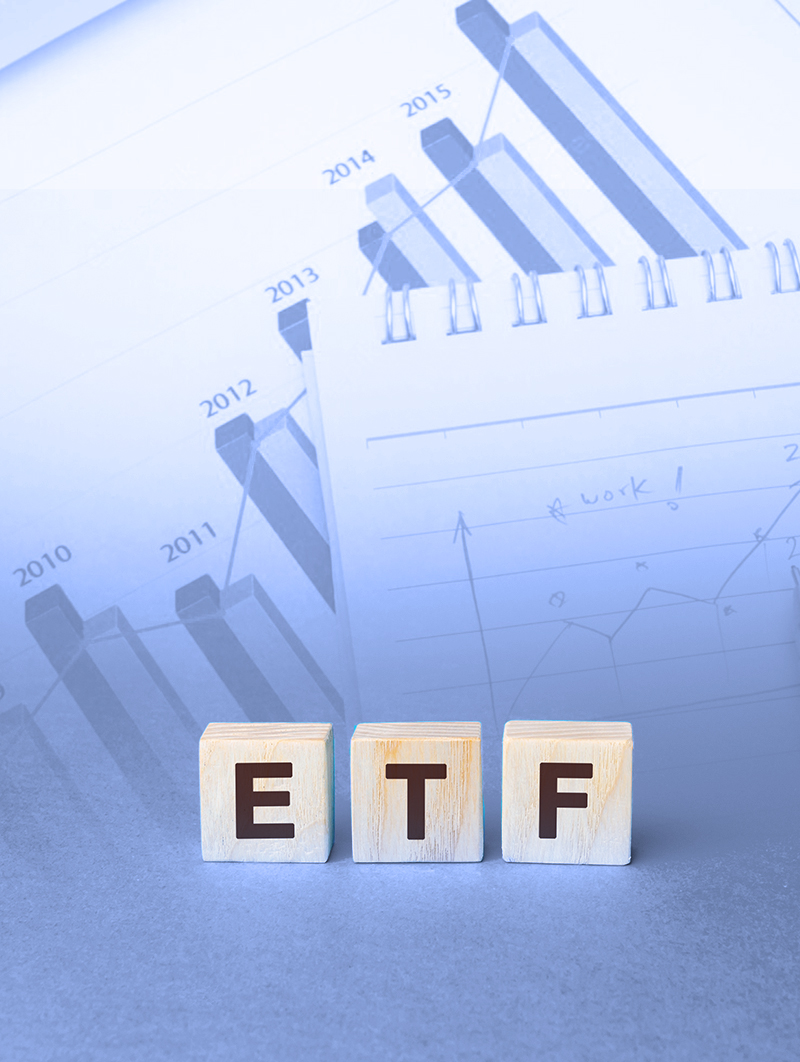Equity Schemes
A mutual fund scheme that is primarily invested in the stocks or shares of companies is called an Equity Fund. They are also popularly known as Growth Funds. There are two types of Equity Funds:

Active Equity Fund
Active Equity Fund is the type of fund in which a Fund Manager is directly involved in scanning the market, conducting research of various companies, identifying and analyzing the performance of stocks and finding out the best investible stocks.

Passive Equity Fund
Passive Equity Fund is the type of fund that does not require the Fund Manager to be involved in any research. He simply creates a portfolio that follows a reputed market index and waits for a fund to reach its maximum potential.

Equity Funds can also be categorized according to Market Capitalization. As per SEBI, there are the following segments:
Large Cap equity funds are the Top 100 stocks by market capitalization. The companies that these stocks belong to, are large in size, are usually market leaders in their particular sector, have higher financial strength and widespread ownership by the public. Investors look at large cap stocks as low-risk and hence their values are higher.
If you are looking for ways to grow your money in a slow yet steady way, without taking risks, large cap equity funds are your best bet.
Large & Mid-Cap Funds invest in both large cap as well as mid cap stocks. A minimum value of 35% of the total assets has to be invested in equity and equity related instruments of large cap companies.
Midcap equity funds
Midcap equity funds are the 101st-250th stocks by market capitalization. The companies to which these stocks belong to are smaller in size and public shareholdings are fewer. While you can trade midcap funds at lower valuations, they tend to be riskier than large caps and also have the potential of higher returns. Basically, if you are not in a rush and wish to indulge in long-term investments at lower valuations, then midcap equity funds are what you can consider. However, these funds are not ideal for short-term quick gains as they are highly volatile for shorter periods.
Small cap equity funds
Small cap equity funds are those that range from the 251st to smaller stocks. With much less free-floating shares, small cap companies are primarily owned by promoter families. They are also better for long-term investments as the percentage of volatility increases in short-term. In the longer run, they have the potential to give higher returns than large cap or midcap funds but they always carry a risk of low liquidity when market conditions are extreme.
Dividend Yield Fund primarily invests in dividend yielding stocks. It is an open-ended equity scheme in which 65% of total assets is invested in equity.
Contra Fund Or Value Fund invests 65% of total assets in equity and equity related instruments. It is an open-ended equity scheme.
Focused fund investing in a maximum of 30 stocks, focused fund is an open-ended equity scheme that invests a minimum of 65% in equity and equity related instruments.
Thematic Or Sectoral invests in specific sectors for example, bank, construction, telecom, infrastructure, power etc. While being an open-ended equity scheme, it invests a minimum of 80% of total assets in equity and equity related instruments.


ELSS Tax Saving Funds
ELSS or Equity Linked Savings schemes are equity mutual funds, with a mandatory lock-in period of 3 years, that help you to save taxes. There are innumerable investment schemes in the market but all their returns are taxed as per Income Tax rules. However, ELSS funds offer tax deduction benefits under Section 80C of the Income Tax Act. Under this act, you can avail up to Rs. 1.5 lakh of tax deduction when you invest money in ELSS. The income acquired from the returns is considered as Long-Term Capital Gains and they are exempted from taxation up to an amount of Rs. 1 lakh in a given financial year. Returns above Rs. 1 lakh will be taxed at 10%.
At Swaraj Shares, we encourage our clients to invest in ELSS schemes so that they can enjoy tax exemption up to an amount of Rs. 1,50,000.
Flexi-Cap Fund invests a minimum of 65% in equity and equity related instruments. While being an open-ended equity scheme, it is also dynamic in nature and the investment can be spread across large cap, mid cap as well as small cap stocks.
Why should you invest in Equity Fund Schemes?
We have listed 10 reasons for you to invest in Equity Fund Schemes right away.
- With equity funds, you can invest in multiple stocks that offers diversification to your investment portfolio.
- Since your portfolio is diversified, your sector-specific risk is mitigated to a large extent.
- The fund managers at Swaraj Shares research and analyze the best stocks to help you gain optimum returns.
- Investors looking for long-term capital appreciation benefit from investing in equity funds.
- Equity funds are cost-effective as you can invest a lump sum amount and also in the form of Systematic Investment Plans (SIPs).
- Equity funds are open-ended and do not have lock-in periods. This makes them flexible and highly liquid.
- Investors can choose between dividend plans and growth.
- The power of compounding can lead to large capital gains if you choose to invest long-term.
- All the norms of mutual fund schemes, including equity funds, are laid down by The Securities and Exchange Board of India (SEBI) and are therefore safe.
- Equity funds give you tax benefits.

DEBT SCHEMES
Debt Funds are those types of mutual funds that invest in instruments like treasury bills, government securities, corporate bonds and government bonds etc. These instruments have a pre-fixed date of maturity and also a rate of interest that the investor earns when the funds mature. Market fluctuations do not affect debt funds and this is why they are considered as low-risk investments. They are also known as Bond funds or Fixed Income Funds.
What are the different types of Debt Fund Schemes?
Debt fund schemes are primarily categorized according to their maturity period. Listed below are the classifications.

Liquid Fund
Liquid Funds are those that invest in debt securities with a maturity date of less than 91 days. These are best suited for short-term investments since they give steady returns and are less volatile.

Money Market Fund
These funds invest in debt securities with maturity dates of up to a year. The returns are generated via interest income and these are also suitable for short-term investments.

Dynamic Bond Fund
These funds invest in instruments that have varying maturity dates. These are suitable for investors who have an investment plan of 3-5 years and have moderate risk tolerance.

Overnight Funds
Staying true to their name, these funds invest in debt securities with a maturity date of 1 day. Scoring high on safety, convenience and liquidity, these are suitable for investors who want to park money for a very short period.

Corporate Bond Fund
Suitable for investors with low-risk tolerance, these funds give regular income and invest a bare minimum of 80% of the portfolio in high-quality corporate bonds.

Banking & PSU Funds
a product with moderate risk, these funds invest in a bare minimum of a total asset in PSU and bank-issued debt instruments.

Gilt Fund
Carrying a high risk of interest rate, these funds can be for both long and short durations. They invest in government securities with varying dates of maturity.

Gilt Fund with 10-year constant duration
It is an open-ended debt scheme that invests a minimum of 80% of total assets in government sectors that have a constant maturity of 10 years.

Short Duration Funds
with higher returns but more NAV volatility, these funds are a mix of short and long-term debt and are suitable for investors looking to invest for 1-3 years.

Medium Duration Funds
with a considerably high risk of interest rate, medium duration funds invest in debt instruments issued by government, public and private sector companies. The investment window has to be within 3-4 years.

Ultra-short Duration Funds
suitable for investors with an investment window of 3-6 months, these funds give better returns than liquid funds and have lower risk association.

Low Duration Funds
suitable for investors with an investment window of 6 months-1 year, these funds offer reasonable returns with moderate risk association.

Medium to Long Duration Funds
these funds invest in debt instruments for a tenure of 4-7 years.

Long Duration Funds
the investment window of these funds is more than 7 years and they also invest in debt instruments issued by Government, private and public sector companies.

Floater fund
Carrying a low-interest rate risk, these funds invest a minimum of 65% of their total assets in floating-rate bonds.

Credit Risk Funds
investors who do not mind taking on a greater default risk can invest in these funds as the returns are higher. These funds invest 65% of investible assets in AA or lower-rated corporate bonds.

Why should you invest in Debt Fund Schemes?
At Swaraj Shares & Securities Pvt. Ltd. we advise retail investors or investors who maintain their funds in bank deposits to invest in debt fund schemes. For investors who have low-risk tolerance and expect steady but not guaranteed returns, debt funds work well. Alongside, short-term investors with an investment window of 3-12 months and medium-term investors who are looking to invest for 3-5 years benefit from investing in Debt Fund schemes.
Listed below are 3 reasons why we suggest you invest in these schemes:
- We research and identify the best performing debt funds that help to reduce your risk and balance your portfolio.
- Debt funds give you a wide spectrum of investment options.
- They are easily redeemable and are thus highly liquid funds.
With a minimal expense ratio, debt funds are genuinely a low-cost investment option.
HYBRID FUND SCHEMES
Hybrid funds are those that majorly invest in a combination of two asset classes- Equity & Debt. The idea behind investing in hybrid fund schemes is to maintain a balance and reduce the risk of a given portfolio. Equity assets are capable of generating higher returns but they do carry a higher risk of volatility. Contrarily, debt assets help to generate regular income and carry a lower risk. In this regard, when the equity market conditions are favourable, the equity part of the portfolio helps to create wealth and when the market is not doing so well, the debt fund part of the portfolio acts as a cushion.
At Swaraj Shares, our fund managers are professionally trained and equipped with technical expertise to identify and implement the most effective asset allocation for a portfolio so that hybrid fund schemes prove to be productive at all times.
Who should invest in Hybrid Fund Schemes?
- A First-timer
if you are a new investor, hybrid fund schemes can offer you the kind of stability that a more conventional investment option like a fixed deposit does. Especially when you invest with Swaraj Shares, our fund manager helps to allocate your funds in the most effective manner.
- When you need growth without risk
Owing to the balance in the portfolio because of 2 types of asset classes, hybrid fund schemes are perfect for investors who are looking to grow their funds with reduced risk over a period of 3-5 years.


- For Regular Income
Retired individuals, who are not entitled to a pension, can invest in hybrid fund schemes that will help generate regular income even after their retirement.
- For Asset Allocation
Investors who believe in not keeping all their eggs in the same basket but do not have the technical expertise or the time to allocate their funds among various asset classes, can invest in hybrid fund schemes. They will have a prefixed investment portfolio ready for them.
What are the different types of Hybrid Fund Schemes?
There are different types of Hybrid Fund schemes and they are categorized as:
- Conservative Hybrid- primarily invested in debt instruments, it is an open-ended hybrid scheme that invests 75-90% in debt instruments and the rest 10-25% in equity and equity related instruments.
- Aggressive Hybrid- predominantly invested in stocks around 75% and the rest investments in instruments like Fixed deposits, these funds have reduced risk than an all-equity portfolio and similar kind of returns in case of long-term investments.
- Balanced Hybrid- staying true to its name, this scheme offers a true definition of a balanced portfolio. Invested equally among stocks and instruments like fixed deposits, this fund gives you stable growth.
- Equity Savings- invested almost equally among stocks, instruments like fixed deposits and other hedging instruments that are risk-free, equity savings offer higher returns than FDs.
-
- Conservative Hybrid- predominantly invested in Fixed deposit-like instruments and the rest in stocks, conservative hybrid schemes offer higher returns than FDs while keeping the risks reduced.
- Dynamic Asset Allocation Funds- in order to give you the best possible returns, these funds invest in a combination of stocks and FD-like financial instruments but keep changing the allocation ratio as per the market conditions.
- Multi Asset Allocation Funds- typically invested with 10% in 3 asset classes, these funds have a mix of debt, equity, real estate, gold etc.
- Arbitrage Mutual Funds- different markets have different prices and arbitrage mutual funds take advantage of this strategy of generating returns by buying and selling securities in various market conditions.

Why should you invest in Hybrid Fund Schemes?
The most important reason to invest in Hybrid Fund Schemes is the risk reduction of a given portfolio. Since hybrid funds invest in various asset classes and the prices of these assets do not move in the same direction, there are fewer risks to the portfolio. This helps to create wealth in the longer run.
SOLUTION-ORIENTED FUNDS
Staying true to their name, solution-oriented mutual funds are especially well-suited for investors who have fixed goals like child education, marriage, retirement planning etc. With a longer investment tenure and reduced risks, these funds have a lock-in period of 5 years and offer tax-saving benefits as well.
Who should invest in Solution-oriented funds?
- Investors who are looking for longer durations of investment should opt for these funds as they have a lock-in period of 5 years.
- Those who have a specific financial goal or objective to fulfill will benefit from these funds.

What are the different types of Solution-oriented funds?
According to SEBI, solution-oriented funds can be classified into two categories and they are:
Retirement Funds- after retirement, continuing to have a regular source of income is a dream that many of us harbour. Pension post retirement is no longer the privilege of government employees alone. At Swaraj Shares, you have the option to invest in our Retirement mutual funds scheme, through which, high-performing stocks would be accumulated during your earning tenure and a retirement corpus will be built for you. You have the option of redeeming the entire amount or withdraw periodically in the form of a pension. These have a lock-in period of 5 years.
Children’s Funds- At Swaraj Shares, we understand how expensive children’s education has become and with competition at its peak, it is a sad plight when your child is unable to pursue a dream only because the funds are not enough. To help you cater to this need, we offer customized plans, keeping in mind the age and the academic needs of the child. We offer two kinds of plans:
- Equity-oriented plan- well-suited for a child who is yet to be born or a very young baby. Yielding high returns, this plan holds well for long-term financial goals.
- Debt-oriented plan-well-suited for a child who is on the verge of completing their primary education.
ETFs & INDEX FUNDS
What is an ETF?
ETFs or Exchange Traded funds bring together to benefits of a diversified portfolio and the simplicity of trading common stock on a stock exchange. ETF units can be bought or sold via a registered broker of a reputed stock exchange. ETF units are listed in stock exchanges and according to market movements, there are variations in the NAV. An investor is free to buy any amount of ETF units as per his or her liking and there is no stock exchange restriction.
ETFs always stay close to the corresponding index that they are based on and they never try to outperform the market. They strive to be the market.
Some of the most popular categories of ETF products that we offer are:
- Index ETF
- Gold ETF
- Bank ETF
- International ETFs
- Liquid ETF


INDEX FUNDS
What are Index Funds?
A passive way of investing in the stock market, are created in a way so that they can match but not outdo the performance of the underlying indices they are based on, like Nifty Midcap, BSE Sensex etc. At Swaraj Shares, we select only the best performing Index Funds that have rank the least in terms of tracking error.
What are the advantages of investing in Index Funds?
When you invest in Index funds offered by Swaraj Shares & Securities, you avail the following benefits:
- Human-error proof
Human bias or human error can impact your mutual funds investment to a large extent. While humans are vulnerable to errors in judgement, a benchmark index is not. In Index funds, a fund manager follows an automated approach and thus, human errors are eliminated.
- Low expense ratio
A passively managed fund naturally has a lower expense ratio because there is no money to be spent on active fund managers or research teams that reduce the costs significantly.
- Portfolio diversification
Index funds give your portfolio exposure to a large segment of the market and thus allows your portfolio to be diversified with reduced risk.
GOLD ETF
An ETF that strives to track market gold prices and carries the same value as that of 24K pure physical form of gold. If you are an investor, you can buy gold that will become a financial asset in the form of Gold ETF.
BANK ETF
There is an entire range of banking stocks that are listed on the stock exchange. Bank ETFs invest in this basket of stocks.
LIQUID ETF
True to its name, these ETFs invest in financial instruments that have short term maturities. The liquid ETFs are meant to improve returns and reduce the risk of pricing.
FUNDS OF FUNDS (FOFs)
Funds of Funds can be both domestic as well as overseas. It is an open-ended fund that invests in an underlying fund. A minimum of 95% of total assets should be invested in an underlying fund.
FIXED MATURITY PLANS (FMPs)
These are close-ended debt funds in which the fund manager plays a vital role in choosing the investment options. These are close-ended debt funds and the maturity of the scheme is closely aligned with the duration of the investment. An investor can clearly understand the kind of returns they can expect if they can stay invested up to maturity.

CAPITAL PROTECTION FUNDS
Hybrid funds that are close-ended are also called capital protection funds. The portfolio is designed in a way so that a part of the principal amount is invested in debt instruments. This allows the part to grow to reach the principal amount over a period of time and thus, the principal amount is protected. The remaining amount of the principal is invested in equity derivatives to get higher returns.






